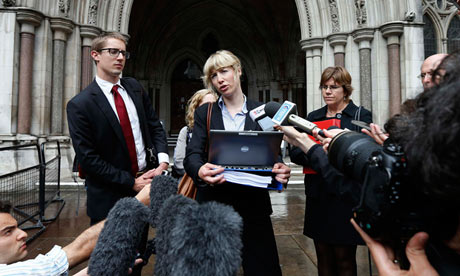The British government took over three weeks to act on authoritative information about the whereabouts of a trove of secret British intelligence data leaked by the whistleblower Edward Snowden, despite now claiming the information risks "grave damage" to the security of British intelligence and armed forces, the Guardian said on Friday.
Guardian News and Media's editor-in-chief, Alan Rusbridger, hit back at Downing Street's claims made in the high court that it "urgently" needed to access leaked intelligence data seized at Heathrow airport earlier this month from the partner of Glenn Greenwald, the Guardian journalist reporting on US and UK mass digital surveillance programmes.
Rusbridger said that on 22 July, two days after the Guardian complied with a government request to destroy computer hardware containing encrypted GCHQ files from Snowden, a former CIA employee, executives at the newspaper directed the UK government towards the New York Times and ProPublica, US publishers with whom the paper had shared secret material from GCHQ.
It took a further 23 days until the British embassy in Washington contacted Jill Abramson, the US paper's executive editor, by phone about the data. A meeting followed the next day. Since then there has been no further contact with the New York Times, the Guardian said.
On Friday in the latest stage of a high court challenge by David Miranda, Greenwald's partner, over the legality of his arrest on 18 August as he carried leaked data through Heathrow, the UK's deputy national security adviser, Oliver Robbins said in a written submission: "We urgently need to identify and to understand the entirety of the material … in order to assess the risks of sensitive intelligence sources and methods and the threat to intelligence agency staff should their identities or details of their operational tradecraft be obtained by hostile actors."
 David Miranda's lawyer Gwendolen Morgan outside the high court after it granted extended powers to police. Photograph: Suzanne Plunkett/Reuters
David Miranda's lawyer Gwendolen Morgan outside the high court after it granted extended powers to police. Photograph: Suzanne Plunkett/Reuters But Rusbridger said government delays in following up further UK intelligence files in New York "belied the picture of urgency and crisis painted in court".
"The government wanted the judge to believe that they have at all times behaved with the utmost urgency because of a grave threat to national security represented by newspapers working responsibly on the Snowden documents and their implications for society," he said. "But for most of the time since early June little has happened. On July 22 the Guardian directed the government towards the New York Times and ProPublica, both of whom had secret material from GCHQ. It was more than three weeks before anyone contacted the NYT. No one has contacted Pro Publica, and there has been two weeks of further silence towards the NYT from the government. This five weeks in which nothing has happened tells a different story from the alarmist claims before the court. The government's behaviour does not match their rhetoric in trying to justify and exploit this dismaying blurring of terror and journalism."
A spokesman for the Cabinet Office declined to comment pending the ongoing legal action. The New York Times declined to comment on whether the UK authorities asked it to destroy the data.
The high court granted the Metropolitan police extended powers to investigate whether crimes related to terrorism and breaches of the Official Secrets Act have been committed. Appearing for Miranda, Matthew Ryder QC said his client accepted the terms as part of "a pragmatic approach" to the dispute ahead of a full hearing into the legality of Miranda's detention and the seizure of his data which is expected in October.
Following a ruling by Lord Justice Laws and Mr Justice Kenneth Parker, the police will now investigate whether possession of the seized material constitutes a crime under the Terrorism Act 2000 which prohibits possessing information that might be useful to terrorists and specifically "eliciting, publishing or communicating" information about members of the armed forces, intelligence agencies and police which terrorists could use. They are also considering possible crimes under section one of the Official Secrets Act 1911 which deals with communication of material to an enemy and "various offences" under the Official Secrets Act 1989.
 David Miranda, left, with his partner, the Guardian journalist Glenn Greenwald. Photograph: AP
David Miranda, left, with his partner, the Guardian journalist Glenn Greenwald. Photograph: AP In his statement, Robbins claimed the encrypted material included personal information of UK intelligence officers, any compromise of which would result in a risk to the lives of them and their families and the risk they would become recruitment targets for terrorists and hostile spy agencies. The hard drive seized from Miranda contained approximately 58,000 highly classified UK intelligence documents, the compromise of which "would do serious damage to UK national security and ultimately risk lives".
He said a piece of paper with the password to part of the encrypted files was discovered along with the hard drive and Robbins criticised Miranda and his associates for "very poor judgment in their security arrangements with respect to the material rendering the appropriation of the material, or at least access to it by other, non-state actors, a real possibility".
He said the government believes the data may have already been obtained by one or more of the countries through which Snowden has passed since he fled the US. They include China and Russia, where Snowden is currently living.
A separate statement made by the Met police counter-terrorism officer handling the police investigation, detective superintendant Caroline Goode, added that disclosure of the 58,000 documents on the hard drive "would be gravely injurious to UK interests". She said only 75 have so far been decrypted and reconstructed into a legible format.
Gwendolen Morgan, solicitor for Miranda, disputed the evidence presented by the authorities.
"The Home Office and Metropolitan police have lodged evidence with the court in which they make sweeping assertions about national security threats which they said entitled them to look at the materials seized, but they have said that they cannot provide further details in open court," she said. "Mr Miranda does not accept the assertions they have made and is disappointed that the UK government is attempting to justify the use of terrorist powers by making what appear to be unfounded assertions."

No hay comentarios:
Publicar un comentario